 Image search results - "Musashimaru" Image search results - "Musashimaru" |

Ryogoku Kokugikan sumo arena as seen from Ryogoku Station
|
|

Crowd outside the Kokugikan await their favorite wrestlers.
|
|

Crowd enters the Kokugikan for Musashimaru's retirement ceremony on Oct. 2, 2004.
|
|

Passing out programs
|
|

Musashimaru at the entrance
|
|

Musashimaru greets the crowd
|
|

Hawaii's last sumo wrestler shakes hands.If he were married, his wife would be beside him.
|
|

Musashimaru right after I shook his hand.
|
|

Signboard for retirement ceremony at entrance.It reads "Musashimaru, Intai Danpatsu Hiroo Ozumo" which means "Musashimaru Topknot-Cutting and Retirement Sumo Exhibition."
|
|

Musashigawa stablemaster (former Yokozuna Mienoumi) in the entrance hallInside the entrance hallway, there was a long table on the left side with ribbons which served as name tags for distinguished guests. Musashigawa is the name of Musashimaru's sumo stable.
|
|

Entrance hall is clogged up by a side show of hula.
|
|

Musashigawa Stable wrestlers greet visitorsIncludes Miyabiyama and Musoyama.
|
|

In the entrance hall, hula and Hawaiian music direct from Hawaii
|
|

The retirement ceremony had a lot of Hawaiian touches. This was only the beginning.Hula dancers and live Hawaiian band from Hawaii.
|
|

Konishiki also sings. (His company arranged the entertainment.)
|
|

Musashigawa Stable wrestler wearing Aloha-print yukataFlowery pattern (plumeria) with "Musashimaru" imprinted.
|
|

Musashimaru souvenirs at the Kokugikan's souvenir shop
|
|

Musashimaru merchandise
|
|

Musashimaru doll
|
|
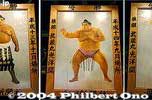
Giant painted pictures of Musashimaru decorating the arena inside. Each one commemorates a tournament victory.These giant pictures are actually black-and-white photographs taken in a photo studio and printed on large paper. Then it is hand-painted in color by a woman who has been doing it for years.
|
|

The ceremony opens with taiko drum beating on the sumo ring.
|
|

Sumo exhibition matches with lower division Makushita wrestlers.A retirement ceremony for an important sumo wrestler includes a variety of activities besides the actual ceremony of cutting away the topknot. It involves almost the entire Japan Sumo Association, and most wrestlers in the top three divisions (Makushita, Juryo, and Makunouchi) also appear in exhibition matches.
|
|

Makushita sumo matchLower-division wrestlers wear black belts, while the upper division wrestlers wear white belts (during practice) or colored belts during official matches.
|
|

Juryo Division dohyo-iri ring-entering ceremony
|
|

Juryo sumo match
|
|

Hairdressing demonstration
|
|

Sumo match with kidsA retirement ceremony for an important sumo wrestler includes a variety of activities besides the actual ceremony of cutting away the topknot. It involves almost the entire Japan Sumo Association, and most wrestlers in the top three divisions (Makushita, Juryo, and Makunouchi) also appear in exhibition matches.
|
|

A retirement ceremony for an important sumo wrestler includes a variety of activities besides the actual ceremony of cutting away the topknot. It involves almost the entire Japan Sumo Association, and most wrestlers in the top three divisions (Makushita, Juryo, and Makunouchi) also appear in exhibition matches.
|
|
|
|

The kids gradually get bigger.
|
|

Ozeki Musoyama is defeated.
|
|

Yobidashi wearing Aloha-print garb
|
|
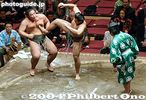
Comic sumo (shokkiri sumo)This is comedy time with two young wrestlers performing various comical antics (spitting at each other, kicking, and other illegal sumo acts) on the ring.
|
|

Comic sumo (shokkiri sumo)This is comedy time with two young wrestlers performing various comical antics (spitting at each other, kicking, and other illegal sumo acts) on the ring.
|
|

Tidying up the ring
|
|

Musashimaru finally appears for a yokozuna belt demo
|
|

Musashimaru acknowledges a spectator as he proceeds to the ring.This was a demonstration on how they tie on the thick, white rope (tsuna) around his waist. The tsuna is the symbol of the yokozuna. It takes several assistants to put it on. They are all wearing white gloves.
|
|

Yokozuna "tsuna" belt demo
|
|

They wrap the rope around his waist from the front, or the thickest part of the rope.This was a demonstration on how they tie on the thick, white rope (tsuna) around his waist. The tsuna is the symbol of the yokozuna. It takes several assistants to put it on. They are all wearing white gloves.
|
|

Pulling it tight
|
|
|
|

Tying the rope at the back.
|
|

Rear view of the shiranui style of tying the rope.He turned in all four directions to show everyone what it looked like. This is what is called the shiranui style of tying the rope. It is characterized by a single loop in the back. The other style, called unryu, has twin loops.
|
|

Musashimaru goes back and then comes back...
|
|
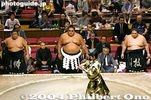
He performs his last yokozuna dohyo-iri ring-entering ceremony. He is flanked by Musoyama on the left as the sword bearer, and Miyabiyama on the right as the dew sweeper.
|
|

Musashimaru's final dohyo-iriHe could have had Yokozuna Asashoryu be either the sword bearer or dew sweeper, but he chose to have his stablemates to join his final dohyo-iri.
|
|

Musashimaru's final dohyo-iri
|
|

Musashimaru's final dohyo-iri
|
|

Musashimaru's final dohyo-iri
|
|

Musashimaru's final dohyo-iri ends
|
|

He goes back to the dressing room
|
|
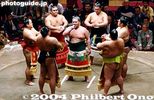
Sumo jinkuThey are singing sumo jinku, a chant-like song about sumo and sumo wrestlers. They are singing about Musashimaru and his career.
|
|

Laying the red carpet for the main event.
|
|

This must be a first, a kumu hula (hula teacher) from Hawaii performing on the sumo ring.He is Sonny Ching, a well-known hula teacher in Hawaii. He brought four male hula dancers who danced at the four corners of the ring.
|
|

Kumu hula Sonny Ching beats the ipu gourd drum, a traditional Hawaiian instrument. This must be a first, a kumu hula performing on the sumo ring in Japan.
|
|

Male hula dancer at one cornerThe original plan was for the hula dancers to perform on the ring itself. But at the last minute, Musashimaru decided that it was not appropriate so they danced outside the ring.
|
|

Calling Musashimaru (with a conch shell)
|
|

Here he comes...
|
|

Head supporter speaks
|
|

The chair
|
|
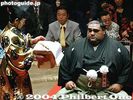
The scissors (golden)I think it was given by French President Chirac who is a sumo fan.
|
|
|

Snip by actor Hiroshi Fujioka, who played Kamen Rider in the '70s.
|
|

Oh, I gotta take a picture of this...Look at the gyoji referee who must be thinking, "C'mon, hurry up!"
|
|

Snip by singer Shigeru MatsuzakiFamous for his classic hit, "Ai no Memory."
|
|

Konishiki is called and he enters
|
|

Snip and a hug by Konishiki (Question: Where was Akebono??)
|
|

Snip by Musashimaru's brother
|
|
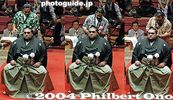
More blood relatives (or brothers)
|
|

Snip by Kitanoumi, the head of the Japan Sumo Association
|
|

Snip by Yokozuna Asashoryu and a symbolic passing of the baton from one foreign yokozuna to the next (and only) foreign yokozuna.Mongolia's Golden Age of Sumo has begun.
|
|

Snip by stablemate Ozeki Musoyama
|
|

He was grim-faced all throughout
|
|
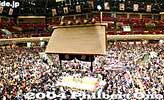
Panoramic shot of the KokugikanNotice the upper floor was quite empty, similar to Akebono's retirement ceremony.
|
|

Awaiting the final cut as we listen to one of his famous matches.
|
|

The final cut by stablemaster Musashigawa Oyakata.
|
|

Musashimaru minus his topknot
|
|

The End of Hawaii's Golden Age in sumo. For the first time since 1968, no wrestler from Hawaii is in the top Makunouchi division.
|
|

Nephews give a flower bouquet (they can step on the sumo ring)
|
|

His mom is next...
|
|

But his mom cannot step on the sumo ring...Females are prohibited from entering the sumo ring. Barring women from stepping onto the sumo ring, even to give an award to a wrestler, is one of the most blatant and preposterous forms of sexual discrimination in Japan. It was devised centuries ago, and for the sake of tradition, traditionalists in the sumo world have maintained this extremely absurd custom and belief that women are considered to be impure (due to menstruation). I'm not saying this as a gaijin (foreigner) who likes to criticize Japan or the Japanese. Nor am I saying this as a women's rights advocate. I say this from the standpoint of plain, old common sense.
Up to 1909, women were actually not allowed enter a sumo arena to view sumo matches. And once upon a time, women were prohibited from setting foot on sacred Mt. Fuji. Can you imagine if these traditions were still being practiced today?
Such discriminatory practices were abolished long ago, and here we are in the 21st century with women still unable to step into the sumo ring. The Japan Sumo Association has constantly rejected requests from important female ministers in the Prime Minister's Cabinet to give an award to the tournament winner in the sumo ring.
|
|

Musashimaru and his flowersThis was his last appearance at this retirement ceremony.
|
|

Makunouchi dohyo-iriNext was exhibition sumo matches by the top-division Makunouchi wrestlers. Musashimaru never appeared again.
|
|

Makunouchi dohyo-iri
|
|

Makunouchi dohyo-iri
|
|

Makunouchi dohyo-iri
|
|

Makunochi dohyo-iri ring-entering ceremony
|
|

Yokozuna Asashoryu performs his dohyo-iri ring-entering ceremony
|
|

Taiko drum demonstration
|
|

"Robocop" Takamisakari gets readyThe top-division Makunouchi wrestlers went through their matches quickly.
|
|

Takamisakari wins
|
|
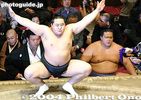
Final match of the day with Yokozuna Asashoryu
|
|

Asashoryu in the face-off
|
|

Asashoryu later won
|
|

Yumitori-shiki bow-twirling ceremony
|
|

Exiting the building
|
|
|
|
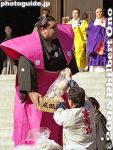
Musashimaru gets his setsubun beans at Narita-san.
|
|

Musashimaru throws setsubun beans at Narita-san
|
|

Musashimaru and Dejima
|
|
|
|